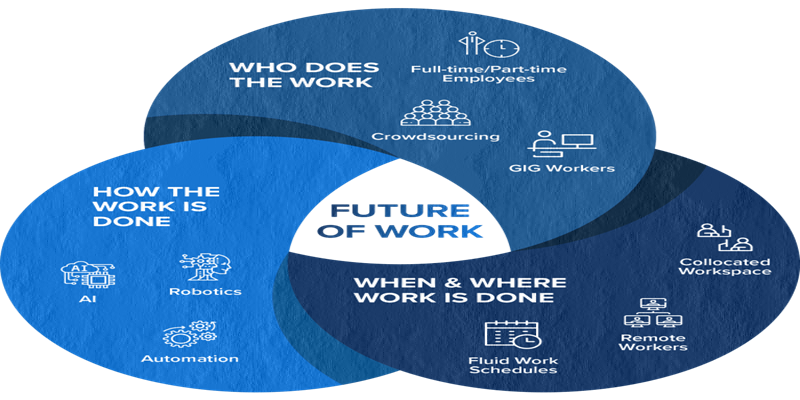The Impact of the Future of Work

The Philippines, like all countries, is experiencing multiple crises brought about by COVID-19 , political unrest in Ukraine, and rising inflation, food, and fuel prices, resulting in uneven recovery and fiscal and financial difficulties, especially for developing countries.
Coupled with this, the country is also experiencing transformative changes in the world of work because of rapid technological innovation, demographic shifts, and climate change.
Rapid technological advancements in recent years are expected to unleash a new wave of productivity gains in enterprises that manage to apply them into their production processes.
Higher life expectancies coupled with lower mortality and reproduction rates have resulted in population ageing in many parts of the world. However, some countries, like the Philippines, continue to have relatively young populations with sizable youth cohorts that enter the labour force in search of decent work.
A large portion of the workforce still derive their livelihoods from the agricultural sector, which is particularly vulnerable to climate change. This highlights the importance of creating “green jobs” that positively impact the environment and ensure a just transition for workers as they change occupations and sectors.
The ILO adopted the Centenary Declaration for the Future of Work in 2019 in response to these challenges and to mark its 100th anniversary.
The Global Commission (GC) on the Future of Work identified a human-centred agenda for a “brighter” Future of Work “that strengthens the social contract by placing people and the work they do at the centre of economic social policy and business practice”.
This human-centred approach consists of three pillars of actions to increase investment in people’s capabilities, institutions of work and decent and sustainable work.
The first pillar, increasing investment in people’s capabilities, includes a universal entitlement to lifelong learning, the strengthening of institutions and policies to support people towards a just transition, the implementation of a transformative agenda for gender equality, and the strengthening of social protection systems.
If people are to thrive in a carbon-neutral digital age, it is necessary to consider the broader dimensions of development and progress in living standards, such as the rights and enabling environment that expand people's opportunities and enhance their well-being.
The second pillar, increasing investment in the institutions of work, calls for establishing universal labour guarantees, in which all workers, regardless of their employment status, are entitled to fundamental workers’ rights and an “adequate living wage”, maximum limits on working hours, and protection of safety and health at work.
These recommendations seek to strengthen and revitalize the institutions of work.
From regulations and employment contracts to collective agreements and labour inspection systems, these institutions are the building blocks of just societies. They forge pathways to formalization, reduce working poverty and secure a future of work with dignity, economic security and equality.
The third and final pillar, increasing investment in decent and sustainable work. The major economic shifts under way – involving new technologies, demographic upheaval and climate change – will have both disruptive and transformative effects on our economies and on work.
Major investments are needed to shape and guide these transformations to create decent work.
Countries must now prioritize long-term, sustainable investments that favour human development and protect the planet, in line with the United Nations 2030 Agenda for Sustainable Development.
These include transformative investments that foster incentives in key areas such as sustainable work, reshaping business incentive structures, and human-centric development indicators. Employment and output shifts towards higher productivity sectors of the economy may require further investments in construction, energy, infrastructure, and transport.
Key findings and recommendations in an ILO report on the future of work in the Philippines include the need to increase investments on skills development, social protection, and ensuring fundamental rights and safety and health at work and continuous social dialogue to shape a human-centred future of work.
In September 2021, the UN launched the Global Accelerator on Jobs and Social Protection for Just Transitions , which seeks to bring together member States, international financial institutions, social partners, civil society, and the private sector to help countries create 400 million decent jobs, including in the green, digital and care economies.
Indeed, there is still much to be done to adapt to the rapid changes brought about by numerous factors and made more complex with recent increases in food and fuel prices. But, as we strive to build a human-centred future of work that is fairer and greener, that serves people and the planet together, we must ensure that employers and businesses remain crucial actors and partners they have always been.
We commend our partner employers and business membership organizations (EBMOs) and its members in their urgent action to advance a human-centred recovery that is inclusive, sustainable and resilient.
At the World Economic Forum in Davos last month, ILO Director-General Gilbert Houngbo said:
“History is at a turning point, and a shift towards greater social justice is vital to reinvigorate social progress alongside economic growth. There is an understanding that economic, social, and environmental concerns must be tackled together and on an equal basis.”
With this in mind, the ILO looks forward to continuing to collaborate with all our partners in the business community for a human-centred future of work where no one is left behind.
By Mr Khalid Hassan,
Director, ILO Country Office for the Philippines.
